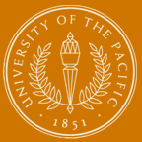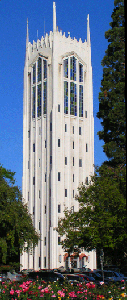University of the Pacific
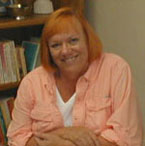 Welcome form Dr Carla Piper - CAL-NET consultant
Welcome form Dr Carla Piper - CAL-NET consultant
University of the Pacific has developed six Early Childhood Education courses as a part of the Early Childhood Curriculum Series in partnership with CAL-NET. These courses are offered through the Pacific Center for Professional and Continuing Education as extended education units. Initial discussions to determine how Pacific could best were initiated between Dr. Jack Nagle, previous Dean of the Pacific Benerd School of Education, Mr. Bob Douglas, the Superintendent of Schools for Tehama Department of Education, and Dr. Carla Piper, previous assistant professor in the Benerd School of Education at Pacific. Under the direction of Dr. Piper, courses were developed and approved by the Assistant Provost, Dr. Barbara Shaw, and the Chair for Curriculum and Development, Dr. Marilyn Draheim. Pacific professor, Dr. Greg Potter and Dr. Piper created and conducted courses in literacy, numeracy, music, math, science, and computers for Early Childhood Education. The University of the Pacific Blackboard forum provided an online framework for some of these classes. The Pacific literacy course content was developed by the University of Texas, Houston C.I.R.C.L.E. faculty. These courses courses were delivered online through Teachscape's E-CIRCLE
ECE100 and ECE101: Developing Children’s Cognitive Readiness in Literacy:
Parts I and 2 (6 units)
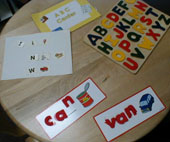 These courses introduce teaching strategies that combine developing cognitive readiness with social and emotional development to teachers of pre-kindergarten age children. Theses courses focus on the practice, purposes and procedures of classroom management and literacy instruction. The student will demonstrate knowledge of the theoretical and research foundations of effective classroom management and literacy instruction for pre-kindergarten children including how classroom environments influence learning and development, the importance of creating a "sound-rich environment" in which children can experience, manipulate, and play with sound, and the importance of vocabulary development and its connection to early literacy: increased vocabulary, higher level of listening comprehension, word recognition, and reading comprehension abilities. Students will design classroom spaces, centers and activities that are meaningful and purposeful, implement effective strategies for developing children’s phonological awareness , and learn techniques for introducing children to new vocabulary, creating a language-rich environment, integrating vocabulary-building activities into every aspect of the school day.
These courses introduce teaching strategies that combine developing cognitive readiness with social and emotional development to teachers of pre-kindergarten age children. Theses courses focus on the practice, purposes and procedures of classroom management and literacy instruction. The student will demonstrate knowledge of the theoretical and research foundations of effective classroom management and literacy instruction for pre-kindergarten children including how classroom environments influence learning and development, the importance of creating a "sound-rich environment" in which children can experience, manipulate, and play with sound, and the importance of vocabulary development and its connection to early literacy: increased vocabulary, higher level of listening comprehension, word recognition, and reading comprehension abilities. Students will design classroom spaces, centers and activities that are meaningful and purposeful, implement effective strategies for developing children’s phonological awareness , and learn techniques for introducing children to new vocabulary, creating a language-rich environment, integrating vocabulary-building activities into every aspect of the school day.
Topics include:
- Designing classroom spaces, centers and activities that are meaningful and purposeful
- Implementing effective strategies for developing children’s phonological awareness
- Introducing techniques for introducing children to new vocabulary, creating a language-rich environment, integrating vocabulary-building activities into every aspect of the school day
- Read Alouds
- Letter Knowledge
- Setting the Stage for Children’s Talk
- Written Expression
ECE102: Music, Literacy, and Numeracy in Early Childhood Education (1 unit)
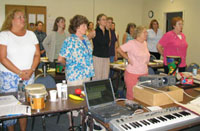 This course is aimed at teachers who do not have musical training. The readings and lesson plan assignments are focused on musical activities that support literacy and numeracy in the preschool classroom. Current brain research is helping us understand of how children learn. Neuroscience has allowed us to see the effect of music on the brain. Musical participation stimulates brain activity, involving the visual, auditory, and kinesthetic senses. The relationship between language and music has been recognized throughout history, particularly as words are expressed through melody and rhythm. Melody is built on the natural phrasing, rhythm, pitch, accent, syllabication, and rhyme of language. Music and math are linked through the natural proportions of rhythm and acoustics. Music notation, like the written word or numeral, is a symbolic representation of sound in time.
This course is aimed at teachers who do not have musical training. The readings and lesson plan assignments are focused on musical activities that support literacy and numeracy in the preschool classroom. Current brain research is helping us understand of how children learn. Neuroscience has allowed us to see the effect of music on the brain. Musical participation stimulates brain activity, involving the visual, auditory, and kinesthetic senses. The relationship between language and music has been recognized throughout history, particularly as words are expressed through melody and rhythm. Melody is built on the natural phrasing, rhythm, pitch, accent, syllabication, and rhyme of language. Music and math are linked through the natural proportions of rhythm and acoustics. Music notation, like the written word or numeral, is a symbolic representation of sound in time.
The exploration of the use of music in early childhood will include the following concepts:
- What are the common elements in music, literacy, and numeracy?
- How is the brain stimulated with musical activity?
- How does singing a lyric and chanting a nursery rhyme promote phonemic awareness?
- In what ways can singing and playing music help children develop language communication skills?
- How can phrasing, pitch, modulation, accent, and syllabication be taught through rhythm and melody?
- How can math concepts be strengthened through rhythmic activities?
- In what ways can music help with memorization?
- How can reading music symbols support the process of learning to read text?
ECE103: Using Computers in Early Childhood Education (3 units)
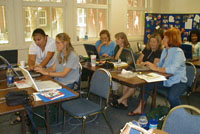 This course will examine research on the use of computers to promote literacy and numeracy in Early Childhood Education. Computer activities and educational software applications will be evaluated in terms of developmentally appropriate instruction and effectiveness for young children. Information literacy will be defined and issues regarding the ethical, legal, and safe use of the Internet will be examined. Students will create professional documents for teacher productivity and communication with parents, colleagues, and children. Students will create an electronic portfolio for professional growth and assessment, learning how to digitize artifacts that provide evidence of teacher competency according to state and national standards. Students will learn how to use ClipBoard, the web-based electronic portfolio system for Early Childhood Educators.
This course will examine research on the use of computers to promote literacy and numeracy in Early Childhood Education. Computer activities and educational software applications will be evaluated in terms of developmentally appropriate instruction and effectiveness for young children. Information literacy will be defined and issues regarding the ethical, legal, and safe use of the Internet will be examined. Students will create professional documents for teacher productivity and communication with parents, colleagues, and children. Students will create an electronic portfolio for professional growth and assessment, learning how to digitize artifacts that provide evidence of teacher competency according to state and national standards. Students will learn how to use ClipBoard, the web-based electronic portfolio system for Early Childhood Educators.
The exploration of the use of computers in early childhood will include the following concepts:
- How can I integrate computer technology into my early childhood curriculum?
- How can I use computer activities to improve young children's literacy and numeracy skills?
- What is information literacy and how important is it in today's society?
- What computer activities and software applications are appropriate for young children according to scientifically based research?
- How can I improve my word processing skills for more effective teaching and better communication with children and parents?
- How can I use computers for teacher productivity?
- What electronic resources are available for professional development?
- How can I create an electronic portfolio assessment for professional growth and development?
- How can I use a digital camera and scanner?
ECE104: Science, Literacy, and Numeracy in Early Childhood Education (1 unit)
 This course is aimed at teachers who do not have science training. The readings and lesson plan assignments are focused on scientific activities that support literacy and numeracy in the preschool classroom. The relationship between language and science exploration has been recognized in multiple studies. We will experience how science can fit into your classroom. Science is all around children and often drives many of their questions and explorations. We will learn how to tap into this natural curiosity to add in teaching the science elements as well as other elements of the curriculum. Science and mathematics are linked through the natural patterns and simple data gathering. Science provides children a reason and purpose to use their numeracy, verbal, writing, and reading skills.
This course is aimed at teachers who do not have science training. The readings and lesson plan assignments are focused on scientific activities that support literacy and numeracy in the preschool classroom. The relationship between language and science exploration has been recognized in multiple studies. We will experience how science can fit into your classroom. Science is all around children and often drives many of their questions and explorations. We will learn how to tap into this natural curiosity to add in teaching the science elements as well as other elements of the curriculum. Science and mathematics are linked through the natural patterns and simple data gathering. Science provides children a reason and purpose to use their numeracy, verbal, writing, and reading skills.
This exploration of early childhood science education will cover the following concepts:
- What are the common elements in science, literacy, and numeracy?
- Define the term science as it relates to early childhood education
- Learn how to plan and execute appropriate science experiences for young children
- Plan and implement the integration of science and literacy activities
- Celebrate the diversity of young learners
ECE105: Numeracy and Mathematics in Early Childhood Education (1 unit)
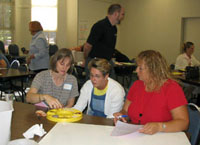 This course is aimed at teachers who have a basic understanding of mathematics, but may not have fully explored methods to deliver it to young children. The readings and lesson plan assignments are focused on mathematical activities that support numeracy in the preschool classroom. Mathematics participation can stimulate brain activity, involving the visual, auditory, and kinesthetic senses. Mathematics is so much more than learning simple addition and subtraction problems. It is a way of thinking and interpreting the world! By learning mathematics at an early age, children are better prepared to use their critical thinking skills that prepare them to cope with any problem that they may encounter.
This course is aimed at teachers who have a basic understanding of mathematics, but may not have fully explored methods to deliver it to young children. The readings and lesson plan assignments are focused on mathematical activities that support numeracy in the preschool classroom. Mathematics participation can stimulate brain activity, involving the visual, auditory, and kinesthetic senses. Mathematics is so much more than learning simple addition and subtraction problems. It is a way of thinking and interpreting the world! By learning mathematics at an early age, children are better prepared to use their critical thinking skills that prepare them to cope with any problem that they may encounter.
This exploration of early childhood mathematics education will cover the following concepts:
- How do children learn mathematics?
- Learn how to plan and execute appropriate mathematics lessons for young children
- Plan and implement the integration of mathematics and literacy activities
- Celebrate the diversity of young learners
- Recognize the qualities of materials that are appropriate for mathematics instruction
- How can math concepts be strengthened through rhythmic activities?

